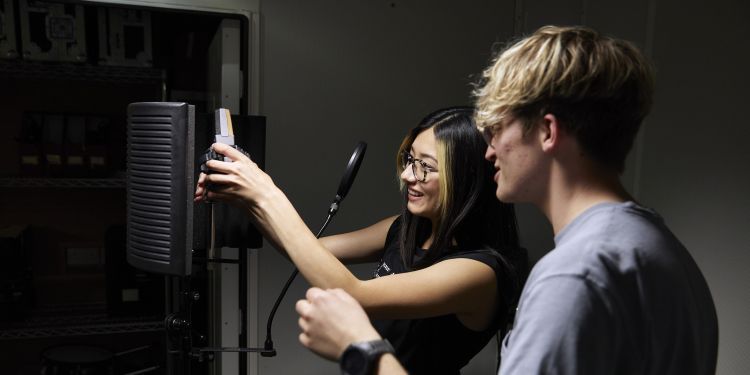Breadcrumb navigation
Electronic & Produced Music FAQs

FAQS about Electronic Music
What is Electronic and Produced Music at Guildhall?
Electronic and produced Music at Guildhall represents a very broad spectrum of musical activity – from experimental, ‘cutting edge’ electro-acoustic composition, manipulation and performance; to more commercially-orientated professional pursuits. Any context where Electronic Technology is centrally involved in the process of creative music making can be considered part of Electronic Music.
We actively encourage applications from candidates across the entire spectrum of this exciting field and, as a result, our student body is typically very mixed. This mix is seen as a crucial positive element of the course where students can benefit through cross-pollination of ideas and mutual inspiration.
How is Principal Study Electronic Music taught at the Guildhall?
We are unique in offering one-to-one tuition in Electronic Music - each student receiving an individual tutorial with one of our professors on a weekly basis. This is supported by a weekly, two-hour, group session where students from every year work together.
As with any conservatoire, there are other non-Principal Study classes to attend and it is expected that between three and six hours a day are devoted to personal study in the Principal Study area.
What qualifications are required for entry to the course?
We recognise that previous qualifications are not always the best indicator of student potential in Electronic & Produced Music. So, whilst it’s useful to know what syllabus you are currently studying and what your projected results are likely to be, we place much more importance on the quality of music you have produced – as demonstrated through the audition process.
What does a typical week look like for a Principal Study Electronic Musician?
Each Electronic Music Student receives a one-hour one-to-one lesson which is scheduled as appropriate. There is also a two-hour ‘group session’ which involves every student in the department (cross-year) and other ‘techniques’ classes to develop essential practical skills.
In addition to these Principal Study classes, all students take two electives (one hour each), a tutorial class (two hours) and a professional studies class (two hours) each week. The balance between ‘Principal Study’ work and ‘Academic Studies’ starts at around 50/50 in the first year. This gradually changes over the four years to anywhere up to 90% concentration on Principal Study work – depending on the options you take.
Can I visit the School prior to applying?
There is an Open Day held usually in October where you may visit the School. Unfortunately, due to the popularity of the course and the busy professional life of our departmental staff, individual visits are not usually possible.
What are the Facilities like and how much access will I get to these?
There is a dedicated studio set aside exclusively for Principal Study students. This provides for the front and back end of the production process (recording and mixing/mastering) and can be booked online from outside the school. We run Quested, Genelec and PMC monitors and have a collection of high quality microphones and mic preamps.
A multi-use studio is also available providing 8 individual editing workstations that are compatible with our main studio. We use Macintosh computers with the following common software: Pro Tools, Logic, MaxMSP, Sibelius, and IRCAM Forum Software. Our main studio also has Cubase, Ableton and a growing collection of other software to aid compatibility with student’s own equipment.
A School Recording Studio – run by staff – serves the entire School, but EM students can book the ‘live room’ outside office hours to link into our dedicated control room. This live room provides space for medium sized ensembles and houses a Steinway B grand piano. Given that we restrict our intake to 20 students across the four years, access to facilities (between 7am and 10pm weekdays and 8am-6pm weekends) is excellent and represents one of the UK’s best ratios in this respect for courses in Electronic Music.
What professional opportunities are there on the course?
Every year we are involved with several external public events and collaborations with world-class partners – such as the BBC Symphony Orchestra, Barbican Cinema and the Wigmore Hall.
Every year, we provide music for the Silent Film series at the Barbican and each student is given the opportunity to compose and perform live electronic music as an accompaniment to silent film in a major public event.
What kind of things do your graduates go on to do?
We have a graduate employment rate of over 95%, based on recent graduates’ careers two years after leaving. Here are links to just a few of our former students:
- Ben Hayes
- Ben Laver (CEO of Box of Toys Audio)
- Christopher Branch
- Emma Williams
- Jethro Cooke
- Jordan Rees
- Jon Daou
- Jo Wills
- Raisa Khan
- Seth Scott
Do all students have to play a conventional instrument?
Most of our students enter the School with considerable experience on a conventional musical instrument – indeed, one of the ways we assess musicality is in hearing a short performance on an instrument. However, whilst unusual, we do not rule out candidates who do not play a conventional instrument and assess each case on its merits.
Can I continue to study my conventional instrument?
We encourage all our students to continue developing their skills on a conventional instrument in addition to developing their keyboard skills. However, opportunities for formal tuition within the School setting is limited:
The Electronic and Produced Music Department funds two students a year to take second-study instrument tuition and we try to award these places fairly over the four year period of the course. Opportunities for playing in ensembles within the School are certainly there, but naturally Principal Study instrumentalists will have first priority in any School organised ensemble.
What should I do if I have further questions?
You can contact the Head of Department, Mike Roberts.